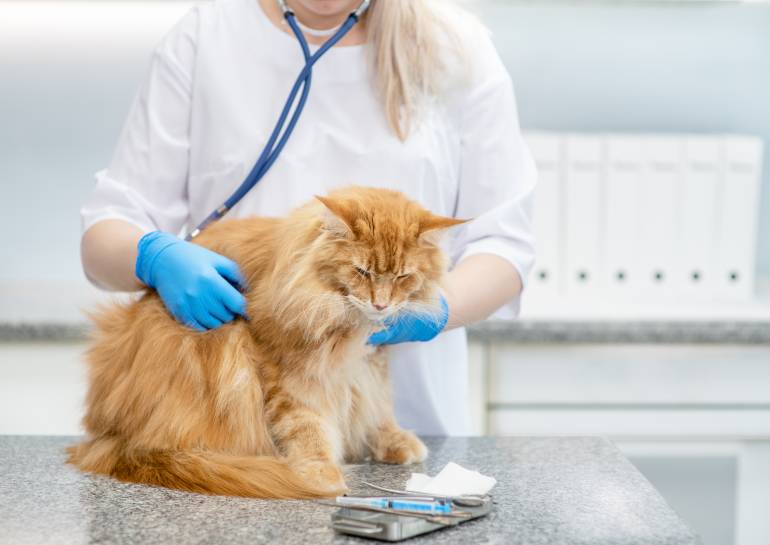Connect with a verified veterinarian in minutes. Licensed vets are available 24/7 to answer your questions. No need to worry about your furry family member.
Keeping your cat healthy and happy is one of the biggest challenges you will face as a pet owner. After all, cats are independent creatures who often don’t like being catered to. However, everything changes as they age and begin to experience health issues. Some of the most common health issues in senior cats are listed below. It also includes some helpful tips on how to take good care of your cat during its senior years.
Constipation
While constipation can happen to cats of any age, it is more common in older cats as their bodies deteriorate with age and react differently to certain illnesses, medications, or diets. As a result, senior cats are more susceptible to constipation, especially when fed dry food or a diet lacking in fibre. Besides, it might indicate underlying problems like kidney or digestive issues.
If your elderly cat is constipated, it may show symptoms such as being lethargic, reluctance to eat, abdominal pain and discomfort, and vomiting. You should seek veterinary help immediately if symptoms persist.
Excessive weight gain
As your cat ages, they are likely to put on a little weight. Obesity is common in older cats, and the condition is more likely to happen if they are not active. However, excessive weight gain is a cause for concern. Make sure your older cat gets enough exercise to avoid excess weight gain. This is important to keep the muscles active and strong so they don’t get muscle spasms and develop arthritis.

Review symptoms, medications & behavior to keep your pets healthy with a Vet Online in just minutes.
Ask a Vet Live NowBlindness and vision problems
Blindness and vision problems are also common in older cats, and they are usually caused by the same thing that causes eye disorders and diseases in people: age. Cataracts, glaucoma, and conjunctivitis are a few of the common eye problems that older cats experience. It’s not always a cause for concern when your cat shows symptoms of vision problems. However, if you are worried about your older cat, it is a good idea to have it examined by your vet. If your cat has long-term vision issues, you might also want to think about getting cat pet insurance to cover any unexpected medical costs and expenses.
Hearing loss
Many older dogs and cats are prone to hearing loss, and the condition is more likely to be noticed in indoor-only pets. Hearing loss in senior cats is caused by the gradual deterioration of ‘hair cells’ in both ears, as well as other age-related changes in the inner ear and auditory nerve.
While hearing loss is often nothing to worry about, it is important to have your cat examined by a vet if it is avoiding the sound of its own name or does not respond to loud noises. Cats who have a sudden decline in hearing may be suffering from a more serious condition, such as an ear infection.
Joint problems
Older cats can be more prone to developing both degenerative and inflammatory forms of arthritis. Therefore, it is important to have your senior cat examined by a vet to rule out joint-related issues such as arthritis, hip dysplasia, and luxating patellas (“slipped-knee syndrome”).
Many joint disorders in older cats can be treated, and most are manageable with medications and lifestyle adjustments. Senior cats with severe joint diseases will often need to have their joints replaced by a specialist veterinary surgeon.
How to care for an elderly feline
Your cat is likely to experience many common health problems with age, so it is important to know what they are and how to care for an elderly feline. We’ve listed some helpful tips below:
- Examine your cat’s eyes on a regular basis. Vision issues such as dry eyes, discharges and crusting, etc., are common with age.
- Keep your cat active. Exercising your cat helps to keep their joints healthy, and it can reduce their chances of developing joint diseases such as arthritis in older cats. Older cats who are not active are more likely to develop joint problems.
- Feed your cat a healthy diet such as canned food with plenty of healthy proteins and vitamins, and avoid feeding human foods.
- Create a safe and private space in your home for your senior cat to rest, recharge and recover.
- Treat your cat with cat treats occasionally.
Connect with a verified veterinarian in minutes. Licensed vets are available 24/7 to answer your questions. No need to worry about your furry family member.

Tom
Tom has always loved to write since he was little - he wanted to be either a writer or a veterinary doctor, but he ended up being a professional writer while most of his works are based on animals. He was born in San Francisco but later moved to Texas to continue his job as a writer. He graduated from the University of San Francisco where he studied biotechnology. He is happily married and a soon to be father!
Review symptoms, medications & behavior to keep your pets healthy with a Vet Online in just minutes.
Ask a Vet Live Now

